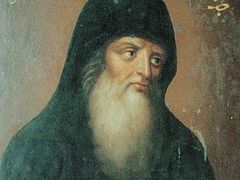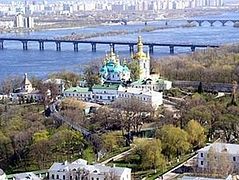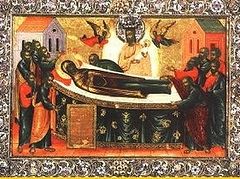Metropolitan Pavel of Vyshgorod and Chernobyl, abbot of the great Kiev-Caves Lavra founded by Sts. Anthony and Theodosius, talks about the Lavra and its role in modern life, about the significance of monasticism, and the undivided nature of Holy Russia.
 Metropolitan Pavel of Vyshgorod and Chernobyl
Metropolitan Pavel of Vyshgorod and Chernobyl
—Your Eminence, tell us how you began your monastic life in the Kiev-Caves Lavra?
—My monastic life began not in the Kiev-Caves Lavra, but at a parish. Six years before coming to the Lavra, from 1984-1994, I was a parish monk. Therefore for me, monasticism in the Lavra was not new, but it did fill me with awe. At the parish everyone obeyed me and I never had to repeat a request. I was an authority to people, and our community was truly strong. To this day, four perpetual Paltsers are read there, and there are many who have received the monastic tonsure.
—When you knew that you would become the abbot of the Lavra, that cradle of Orthodoxy in Rus’, was it frightening? What did you start with?
—After becoming the abbot of the Lavra I learned how many problems there were there, what discord there was among some brothers, and what difficulty there was in relation to the world. There were many bad things being said about the brothers, and this was hard for me to take.
Before that I was in the wealthiest parish in Volhynia and knew no want. I helped many monasteries; after all, in those days many parishes, monasteries and people were in need.
But here were, for the first time, mundane problems: debts for electricity and all the rest. And although the monastery had been open for six years[1] we had no refectory, no church, no vestments—almost nothing. It was difficult, and there was much to frighten me… The Lord arranged it all, and I have been carrying out this obedience since 1994 to the best of my ability and as far as the Lord gives me intelligence. Of course, it’s all possible through the brothers who have gathered here—and there are 200 of them. These are my best assistants, and they are an example for me.
—What would you like to tell us about what has happened in the monastery during these years?
—There has never been a day when rising or laying down to rest I did not ask the Lord for one thing: “O Lord, preserve the brothers from all evil and preserve them in unity, peace, and accord. Preserve the monastery, so that no defilement would ever touch it, so that what happened during the twentieth century—and not only the twentieth century (there were many trials other times, too)—would not happen again.”
 Holy Dormition Kiev-Caves Lavra
Holy Dormition Kiev-Caves Lavra
Today we have what we need—the Lord has already given us everything. The words of St. Theodosy are being fulfilled: “If you will walk in God’s commandments and I will be near the throne of God, then my monastery will flourish.”
Today I think that in the material sense we have everything, as do we also in the spiritual sense. We have such brothers of which the world is not worthy, as the apostle said. There are monks who have not gone out into the world for fifteen to twenty years, and there are strict ascetics. When you look at them you think, “My God, I am not worthy even to carry their boots.” Those are the ascetics we have.
—Do you often have to leave the monastery? What places do you like to visit?
—Earlier, when His Beatitude Metropolitan Vladimir was alive, I often had to leave the monastery for various reasons—mainly because I accompanied His Beatitude on trips. For example, I have been to Jerusalem over fifty-five times in twenty years. I loved and still love to go to Mt. Athos. With His Beatitude Vladimir I visited the dioceses of the Ukraine, Russia, Belorussia, and Moldavia. I have also visited Australia, Spain, and Italy. I have many friends. I very much like Rome—it breathes the love of the martyrs, the faith. When you go to all these holy places, the places of my heavenly protectors Peter and Paul, you can feel their presences, their words of piety…
I go to Spain and Greece for economic reasons, because we buy cloth for the monastery there. But I mainly went with His Beatitude. He took me to the parishes, the dioceses, to Jerusalem and to Mt. Athos.
—Last month you went to the Russian city of Vladimir, where you participated in the anniversary solemnities dedicated to 1000 years since the repose of St. Vladimir. What does the Equal-to-the-Apostles Vladimir mean to you?
—I am very thankful to you for that question. For me, Prince Vladimir was Equal-to-the-Apostles—“equal to the apostolic labors”. For me he is the enlightener, teacher, and head of the country and the Russian Church, because it is he who summoned the bishops and priests, and stood at the head of this excellent event—the Baptist of Holy Rus’. This Baptism happened also earlier. We can’t say that it didn’t. The Holy Apostle Andrew the First Called did not only come to our Rus’ to look, but like all the apostles he left bishops after him; although our history says nothing of this.
 Vladimir. Holy Dormition Cathedral
Vladimir. Holy Dormition Cathedral
For me, St. Vladimir is a luminary, an example for all aspects of human life.
However, unfortunately, our brothers, the citizens of the Ukraine especially, do not remember this. For them the best example today is the deadness of Europe in the full sense of the word. If it hadn’t been for the Russians (and I don’t’ divide them into Ukrainians, Russians, and Belorussians), then there would hardly be an Orthodoxy left on the planet. Let’s take for example Argentina, Australia, China, America, and other countries. Everywhere you’ll find the Russian people upholding Orthodoxy. There is a saying that some people will only go where it’s good, but the Russians are everywhere. Most often these are ethnic Ukrainians.
The light has enlightened us, and we should learn about statehood; we should learn about culture and mercy. We should not follow the example of Prince Vladimir before his baptism, because like the wise thief [on the cross] he also did lawless and bad things—the murder, for example, of John and his father Theodore.[2] There were also many other problems and woes from the pagan prince, but the hour arrived and Vladimir saw Christ in himself. Not himself in Christ, but Christ in himself—Christ Who changed his life. Today many see themselves as “owners” in the Church, forgetting that Christ is the Master of both the Church and our own lives.
The city of Vladimir—and I was there for the first time—is a grand city, very beautiful. The successors and relatives of St. Vladimir—martyr Gleb, Andrei Bogoliubsky, Sts. Peter and Febronia, and many others are all a part of this city’s history. It is characteristic of the churches here to have frescoes by Andrei Rublev, and Rublev was from Volhynia. Thus, our peoples are one people, no matter what anyone says. Metropolitan of Kiev, St. Alexy, directed his steps north of Kiev to the city of Vladimir. It is interesting that St. Vladimir baptized this area. Therefore, we need to hold on to our historical ties, and relate to each other with understanding and love.
—The Baptism of Rus’ and the 1000-year anniversary of the foundation of monasticism in Rus’. What influence did the saints of the Caves have on the spread of Christianity in those times?
—There is testimony that the Lavra was founded in 1013; on Mt. Athos they believe it was in 1016, because St. Anthony was already laboring on Mt. Athos. I will say what I think: St. Anthony—according to the Athonite chronicles—talks about the death of Vladimir and of Boris and Gleb, which means that he saw this and had been on Mt. Athos more than once.
Simeon, Bishop of Suzdal, writes that the Kiev Caves Monastery became the “Upper Room”. Many bishops proceeded from here—monks who received the tonsure from St. Theodosy and [his successor] St. Nikon. They brought the light of Christ’s teaching to the whole world and not only to Russia, because today we know St. Paisius (Velichkovsky) of Neamst, St. Basil of Ryazan, and many others. “Their sound has gone forth into all the world and their works unto the ends of the world,” and thanks to the ascetic labors of Anthony and Theodosy many people are being saved today.

—Does modern monasticism in any way influence the situation in the country? Does it bring it benefit?
—You know, ancient monks during the times of St. Basil the Great and St. John Chrysostom came from the desert in order to sell their handiworks—baskets they had woven and other things, in order to feed themselves. But they also came to the homes of wealthy people in order to enlighten them, as we can see from their Lives. Yes, they were desert dwellers, but when it was necessary to confirm the truth, as in the Seventh Ecumenical Council, they left the deserts and showed the steadfastness and purity of their faith.
We know how St. Theodosy associated with the boyars; there were schools in the monasteries where monks were the teachers, who went out into the world. And it is the same today. A monastery is a light to the world and the salt of the earth. I do not want to diminish the labors of parish priests, for they also carry out a strict obedience, for which I am grateful to them. But they cannot sorrow for the world as do most of the monasteries. People come to the monastery and feel here what they will not feel anywhere else. This is a place where for a thousand years now fervent monastic prayers are poured forth. Glory be to God, today there are remarkable and wise spiritual fathers in the Lavra, and people are drawn to them. There are excellent choirs here, both monastic and seminarian, that bring beauty to the services. Therefore the monasteries are truly a light to the world.
—The triumphant singing at the services in the Kiev Caves Lavra are incomparable to anything. Do you remember what you felt when you heard the Lavra’s singing for the first time?
—I heard it in 1984 in the Moscow Theological Academy at the Holy Trinity St. Sergius Lavra. I was the ecclesiarch of the fourth choir, and sang some with Archimandrite Matthew (Mormyl). I was assistant choirmaster, and sometimes substituted for the choirmaster of the seminary choir.

The Kiev Caves Lavra chant cannot be compared with any other: not with any of the authored chants. It is the kind of singing that makes you think about life, about your existence on the earth and about what you are deprived of without heaven. “Blessed is the man,” “Praise the Name of the Lord,” “By the Waters of Babylon,” “The doors of repentence,” and the hymns of the Liturgy are incomparable to anything. This singing is very touching to me, even to tears. Although I am not a choirmaster I always attentively listen to the singing at services in the Lavra and notice that our singers do not always put everything in to it. I saw how Fr. Matthew sang them—he would be covered with sweat and tears ran down his face; his singing brought me to compunction and reverence.
<…>
I will tell you how I spent my student years in the Holy Trinity-St. Sergius Lavra. I served with Fr. Kirill (Pavlov) on Pascha and Christmas in the Trinity Cathedral of the Lavra. Altogether I served with him a year and a half. I served with Metropolitan Pitirim [Nechayev] for a long time as a deacon. He was very strict: if you didn’t catch his staff, you’d catch it!… But he was also so loving! Vladyda taught me how to walk around the city. As soon as we got out of the car, he’d say, “Blessed is our God…” and I would say to him, “Vladyka, I can’t keep up!” He would answer, “Don’t look here and there—look under your feet and in your heart. Then you’ll keep up!” That is how I got concentrated and learned to keep up with him. To this day I say to my subdeacons, “Don’t look here and there, but look under your feet and in your heart.”
—What should be the most important thing in the education of a young student?
—The most important thing is not to forget that you are a Christian. That is first. Secondly, you have to remember that a person has two eyes, but a million eyes are looking at him, and woe to him through whom temptation comes to the world.
You have to always try to pray.
And most important of all: to gain as much as possible in seminary and academy—if there is someone to gain it from!
—Who of your instructors do you remember the best?
—I had very good instructors. I was friends with Vladyka Jonah of Astrakhan. I had a very good relationship with Vladyka Alexy (Frolov), formerly of Kostroma, with Fr. Illiy [Nozdrov, of Optina], with Frs. Benedict and Platon, with the reposed Archimandrite Mattthew (Mormyl), with Fr. Athanasius (guardian of the Trinity Cathedral)—they all gave me an example of the deepest humility.
 Archimandrite Kirill (Pavlov)
Archimandrite Kirill (Pavlov)
With Fr. Kirill (Pavlov) I read the Philokalia and the Old Testament. He never let anyone read the New Testament. I came to him for the reading—he gave me two pieces of candy one day, and on the next day he gave me a piece of fish with white bread.
I remember coming to him after I had become a bishop, together with Vladyka Philaret of Lvov. He looked at me (I had hidden my bishop’s panagia) and said, “Hey, Pavel, are you a bishop or will you be one soon?” I didn’t want to show off—I said, “Batiushka, well…” At that moment Fr. Philaret ran in and said to me, “Vladyka, His Holiness is waiting for you!” Fr. Kirill made a prostration to me and said, “Ach, you rascal!” (He laughs.) Then he took an icon of the Trinity from the wall and blessed me with it. That’s the friendship I had. For me he was always an instructor. But Fr. Athanasy, the guardian of the Trinity Cathedral, told me exactly a year before my consecration: “You’re going to be Pavel.” But I never liked that name. There are very difficult memories in my life associated with that name.
—And how did they tonsure you with that name?
—In 1988, before my tonsure, Vladyka Varlaam—a “spiritual giant” in my life, asked me, “What name do you want?” I answered, “Vladyka, I like Varlaam, Seraphim of Sarov, Antony of the Kiev Caves…” “You want a lot!” he said. “Dear Vladyka, anything but Pavel!” “That’s the name I am going to give you,” he said. “I drew it three times when casting lots: in the morning I put [the names] in the Gospel, then I put them on the Altar Table, and at evening prayers I also pulled it out…”
Then at the tonsure he pronounced, “Our brother Pavel…” I lost my bearings, but… now I am used to it and can’t remember what my name was when in the world!”

—What would you like to say to today’s Christians? What can’t a Christian be saved without?
—I only ask one thing of God, I tell you honestly—that the Lord would save the monastery from all evil and that all enmity would cease in the Ukraine; that this internecine war would cease. Before, everything was well, and no one wanted to separate… But now these new shakings, these takings over of the government—they are bringing conflict between people. What is happening today is an apocalyptic wind…
Therefore, dear brothers and sisters, the most important thing for us is to forgive each other and embrace each other with brotherly love. They might break our arms. But we must forgive—even if we can’t embrace because our arms are broken we must nevertheless forgive with all our souls, no matter what anyone says.
We must pray for our earthly Fatherland, which the Lord has given us. Once we received independence without bloodshed, and now we are losing our independence with great bloodshed… We must look in our hearts and think about it: what are we leaving to the next generation?
I asked the Ukrainian authorities when the Maidan [revolution] was happening, “What are you doing?! Children should be going to school!” and now you can see what is happening. Our leaders need to think. We don’t need to look at the West or the East. We need to look at ourselves. No one is going to give us anything. If someone wants to beg alms “for the country” so that he can then steal them, let him be cursed with those alms! Our country is very rich; only the Lord, unfortunately, is not giving us decent leaders. But perhaps we don’t deserve them.
I call upon all to pray, so that we might worthily greet all the upcoming feasts and please God, in which may the Merciful Lord help us!




And I too am a follower of Christ the risen Lord..